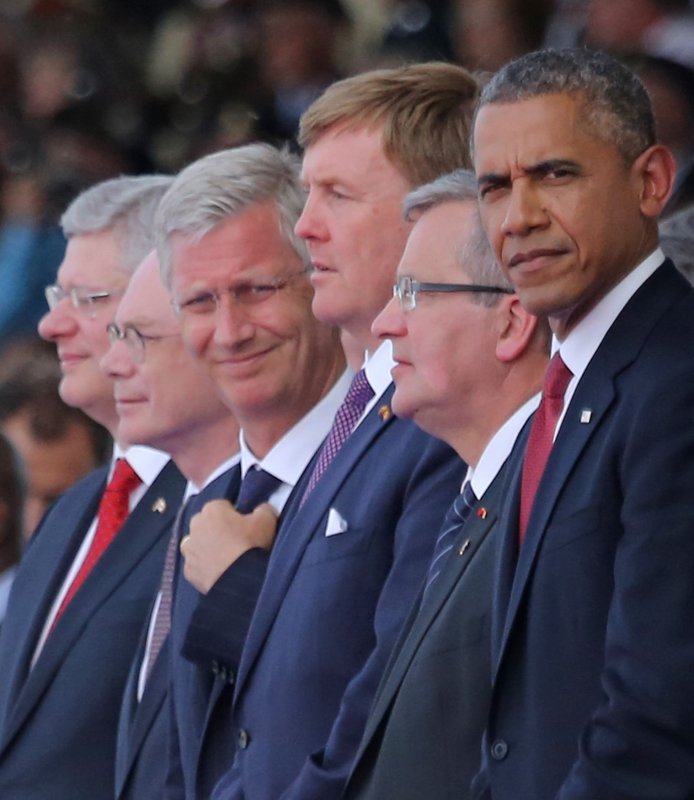U.S. President Barack Obama (R) stands among other dignitaries at Sword Beach in Ouistreham during the international ceremony commemorating the 70th anniversary of the D-Day landings in the Normandy region of France on June 6, 2014. UPI/David Silpa |
License Photo
Every president since Washington suffered from lost opportunities. Of all post-Cold War presidents, in this category Barack Obama may prove to be the biggest loser.
Part of the failing is the White House's doing. And a large part is the pernicious and septic nature of American politics that turns small cuts into potentially fatal wounds irrespective of whether Republicans or Democrats control the White House.
The folly over the release of Army soldier Bowe Bergdahl is the latest example of costly White House incompetence that surely squandered any opportunities from the Europe visit. Why would the White House make such a public display of the soldier's release given the ambiguities and uncertainties of how he fell into Taliban hands? And why would the administration make this announcement just prior to the president's trip to Europe for the G-7 meeting and the 70th Anniversary of the Normandy landings ensuring that the visit would be pre-empted by controversy?
The trip to Europe should have been laden with opportunities. Russia's annexation of Crimea forced the European Union and NATO to confront Moscow. With the presence of both President (then-elect) Petro Poroshenko of Ukraine and President Vladimir Putin at the D-Day ceremonies and the bizarre separate dinners President Francois Hollande hosted for President Obama and later his Russian counterpart, the time seemed opportune for dealing with Russia. Instead, in what was described as a chilly fifteen minute chat between Obama and Putin, petulance and not diplomacy permeated the American position.
The Normandy speech afforded the president a grand opportunity for diplomacy. Even if the White House believed that further isolation of Russia over Ukraine was the proper policy, the speech could have at least made reference in light of the 70th anniversary of the landings to the need for Transatlantic cooperation in at least three areas. The first was the critical role of NATO, the successor to the great Transatlantic wartime alliance. With a NATO summit looming in September in Wales and the Afghan drawdown a tough agenda item for making positive spin, the president could have set the stage for the further vital transformation of NATO. He did not.
Although opposition in his own party as well as the November Congressional elections have put the Transatlantic Trade and Investment Partnership is limbo for this year, President Obama could have used the Normandy speech to remind all of the importance of the pact to both sides of the Atlantic. He did not.
Last, with the EU engaged as part of the "P-5 plus 1" nuclear negotiations with Iran, the Normandy speech might have referenced those talks as a means to avert further war and the need for massive military operations such as Overlord. He did not.
At best the speech was jejune with the standard references to Roosevelt and Eisenhower paying tribute to the heroism of especially American and other allied forces. Too bad however, his speechwriters never bothered to study the CBS television broadcast of Ike's return to Normandy on the twentieth anniversary in 1964 along with the iconic journalist Walter Cronkite. Nor did those same writers carefully note Ronald Reagan's stirring remarks at the fortieth anniversary in 1984 that gave full credit to the Soviet Union and the 20 million Russians killed during that war. And while Free French paratroopers jumped into Normandy on D-Day, not a single reference to French participation was made. Surely President Hollande could not have missed that.
After five and a half years in office, it is apparent that many of the biggest crises this White House faces are self-imposed. Competence and its lack are self-evident. From the Afghanistan-Pakistan (AfPak) study in the early days of the administration that was tragically flawed from the outset by reversing the priority of the more important of the two states to the disastrous roll-out of the Affordable Health Care Act and the Bergdahl Rose Garden celebration, this White House too often shows its incompetence.
Policy execution has always been tough. Today's politics makes execution that much tougher. However, self-inflicted wounds are doubly dangerous as they should be avoidable. Worse, they rob administrations of creating and seizing on opportunities to advance their agenda and more importantly to help the nation.
Thanks goodness FDR, Churchill and Eisenhower were around on June 6th, 1944. It is frightening to think what would have happened if the Obama White House was in charge seventy years ago.
___________________________________________________________________
Harlan Ullman is Chairman of the Killowen Group that advises leaders of government and business, Senior Advisor at Washington D.C.'s Atlantic Council. This column comes from his latest book, due out this Fall, is A Handful of Bullets: How the Murder of Archduke Franz Ferdinand Still Menaces The Peace .















